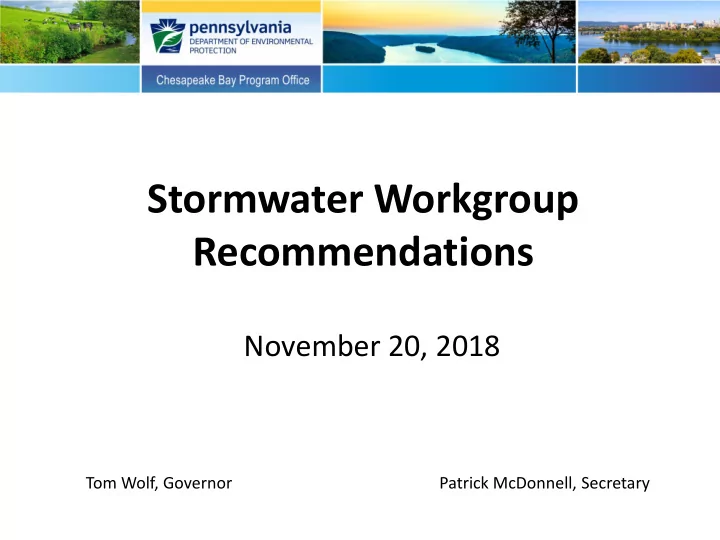

Stormwater Workgroup Recommendations November 20, 2018 Tom Wolf, Governor Patrick McDonnell, Secretary
Stormwater Workgroup Co-Chairs: Felicia Dell (York County Planning Commission) Sean Furjanic (DEP) Coordinator: Lee Murphy (DEP) Members: Seth Noll (Yoe Borough) Renee Reber (American Rivers) Paul Bruder (Mette, Evans & Woodside) Jeremy Miller (Hampden Township) Daryl St. Clair (PennDOT) Bryan Seipp (Center for Watershed Protection) Elizabeth Ottinger (EPA) Teddie Kreitz (Keller Engineers) Mike Jeffers (Kinsley Properties) Advisors: Tom Schueler (Chesapeake Stormwater Network) Kim Dagen (SRBC) Matt Johnston (Chesapeake Bay Program)
Workgroup Mission Statement The purpose of the Stormwater Workgroup is to assist DEP with development of the Phase III Watershed Implementation Plan for the Chesapeake Bay TMDL by considering how Pennsylvania can achieve 2025 Planning Targets established by EPA and, overall, the load and wasteload allocations established in the TMDL. The focus of the Stormwater Workgroup will be on determining what voluntary and mandatory activities will take place between 2019 and 2025 and when. The activities of concern will be those that will reduce nutrients and sediment in stormwater associated with industrial and construction activities and in discharges from municipal separate storm sewer systems (MS4s) and other stormwater discharges, including those currently unregulated. The Workgroup will work collaboratively with other WIP Workgroups and partners to decide upon practical implementation goals for the stormwater sector. The Workgroup will be responsible for drafting or assisting DEP in the drafting of a Stormwater section of the Phase III WIP. The Workgroup will meet in person or via conference call on a periodic basis starting in the summer of 2017 and ending upon submission of the final Phase III WIP in the spring of 2019.
Core Recommendations 1. Current MS4 Permit Term (PRP BMPs) 2. New Riparian Forest Buffers 3. IDD&E Controls 4. Next Industrial Stormwater Permit Term 5. Fertilizer Legislation
Current MS4 Permit Term • BMPs from 50 Pollutant Reduction Plans (PRPs) were used to extrapolate the expected MS4 BMPs across watershed – 83,905,157 lbs sediment reduction – 172,340 lbs N reduction – 15,919 lbs P reduction
New Riparian Forest Buffers • The Workgroup estimates that 450 acres of new riparian forest buffers and 50 acres of new tree canopy cover will be established in developed areas by 2025. – 987,550 lbs sediment reduction – 7,741 lbs N reduction – 16,424 lbs P reduction
IDD&E Controls • Discharges from pools and residential car washing to MS4s no longer authorized under 2018 MS4 NPDES permits. – 271,540 lbs sediment reduction – 2,831 lbs N reduction – 3,664 lbs P reduction
Next Industrial Stormwater Permit • The Workgroup recommended that PAG- 03 require reduction practices similar to those of MS4s, resulting in an estimated reduction of 250 acres of impervious. – 988,379 lbs sediment reduction – 1,996 lbs N reduction – 24 lbs P reduction
Fertilizer Legislation • The Workgroup recommended that it be assumed that fertilizer legislation will be signed into law by 2025. – 0 lbs sediment reduction – 187,901 lbs N reduction – 220,923 lbs P reduction
Core Recommendations • The five core recommendations are estimated to result in: – 86 million lbs sediment reduction – 0.373 million lbs N reduction – 0.257 million lbs P reduction
Next MS4 Permit Term An additional reduction of 0.973 million lbs N could be achieved if: • Pollutant Reduction Plans are based on NLCD “developed lands” instead of “urbanized area” • A 5% MS4 N reduction goal is established • An option is provided to reduce loads from ag lands as well as developed lands
Steering Committee Decisions
UA vs. NLCD Developed Land • “Urbanized Area” (UA) includes only 34% of developed land • 39% of UA is not actually developed • “National Land Cover Database” (NLCD) developed land is a more accurate indicator of land contributing to impairments through stormwater runoff
What Are the Implications? • All municipalities have “NLCD - Developed” lands, which means… • To regulate NLCD developed lands under the current “each municipality is a permittee” approach would result in regulating all 1,183 municipalities in the Bay watershed! (334 currently + 849 new)
County or Regional Permitting So the Workgroup recommends that counties (or other regional entities) be co-permittees with the municipalities in their jurisdictions.
County or Regional Permitting From EPA’s Phase III WIP Expectations Document: “Facilitating the development of Municipal Separate Storm Sewer System (MS4) multi- jurisdictional pollutant reduction plans designed to achieve local water quality and Chesapeake Bay water quality goals.”
Or, If We Continue With Separate Permits… DEP has the authority to designate municipalities (or other entities) as MS4 permittees… There are 161 non-MS4 municipalities in the Bay watershed with populations over 2,500 which could be added to the current total of 334
Other Recommendations • Orphan BMPs • Private Property Easements • MS4 Outreach
Other Recommendations If the MS4-regulated area is not expanded, Non-MS4 Data Collection could be pursued in the non-regulated area
Other Recommendations Improvements to the Chapter 102 Construction Stormwater permit process could also be pursued: • Pre-to-Post Water Quality Analysis • Meet Load Allocations for TMDLs • Improve Chapter 102 BMP Inventory
Other Recommendations Support for and enforcement of Act 167 (the 1978 Stormwater Management Act) could also be pursued: If there is to be a joint county/municipal MS4 permit, a rejuvenated Act 167 program would complement work on the MS4 permit.
Summary 5 Core Recommendations Proposal Status PRP BMPs Progress Underway IDDE Controls Progress Underway New Buffers Anticipated by 2025 Industrial Stormwater Permit To be developed by 2021 Changes Fertilizer Legislation Anticipated by 2025
Summary Next MS4 Permit Term Proposal Expand UA to NLCD-Developed for PRPs – 5% N Reduction County/Regional Permitting OR Collect Non-MS4 Data Designate additional MS4 permittees
Summary Other Recommendations Proposal Orphan BMPs Private Property Easements MS4 Outreach Chapter 102 Improvements Support and Rejuvenate Act 167 Stormwater Management
Recommend
More recommend